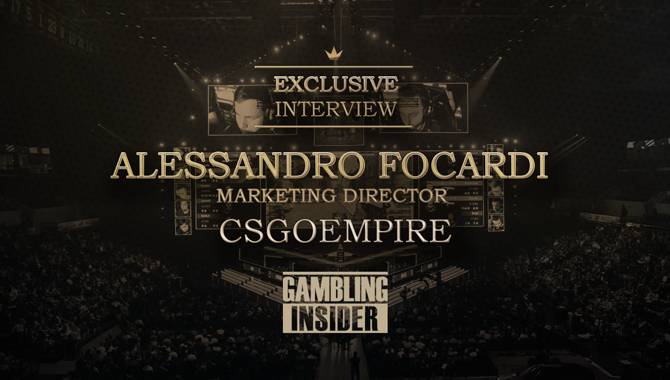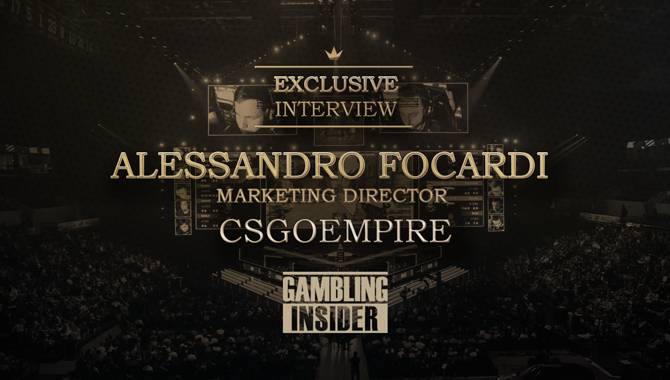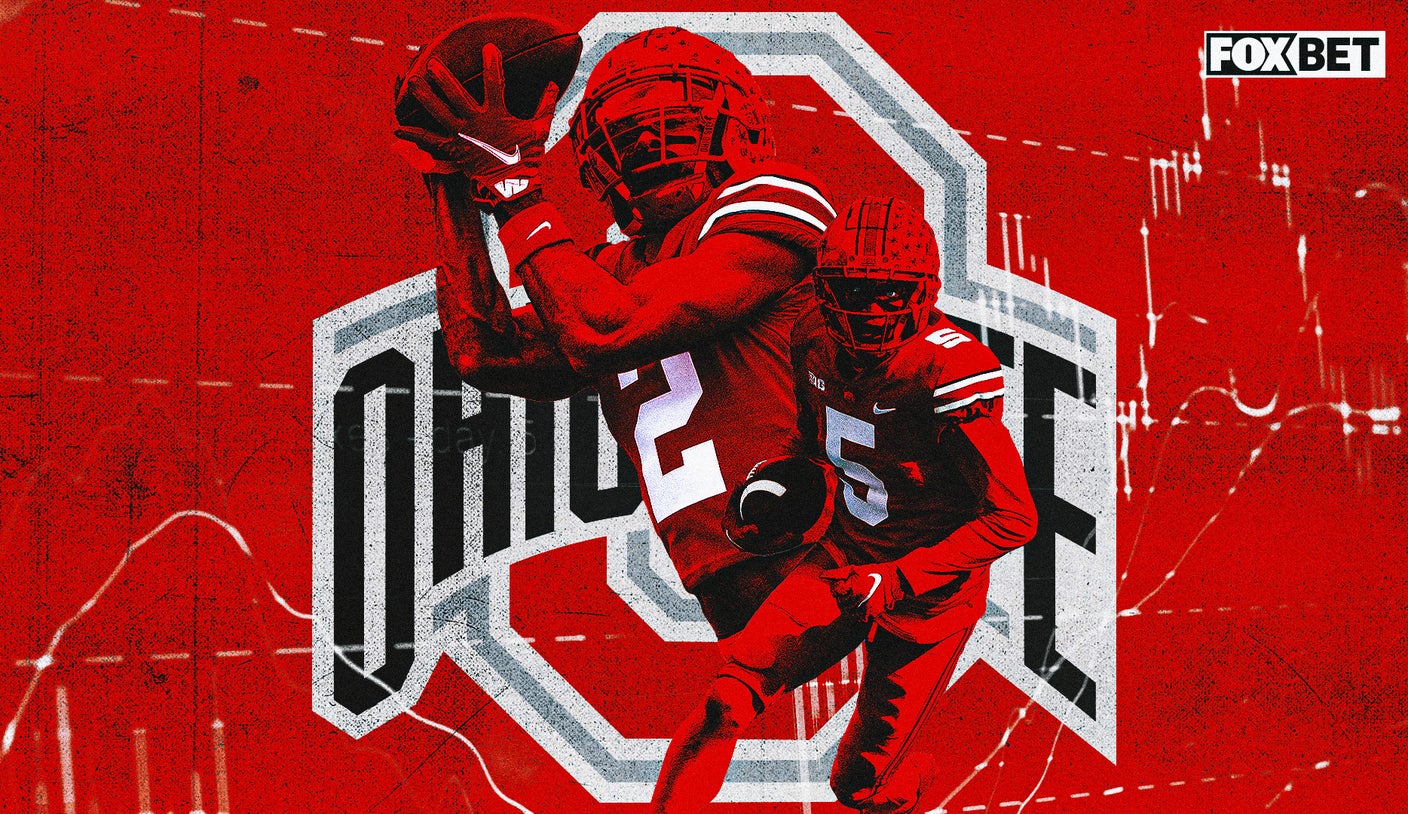
Could you give us a brief overview of your role with the company and how the company fits into the industry as a whole?
I run marketing at CSGOEmpire. The company was one of the earliest CS:GO skin gambling websites in the world and it’s probably the largest at the moment. We launched esports betting almost two and a half years ago and since then it has become a large product for us. When it comes to CS:GO, as you might know, it is the most popular video game when it comes to betting. We’ve been able to create our own product with our own spin, and the market has taken to us, so we’re very happy with a) the result and b) the feedback we’ve received from our users when it comes to the match betting product.
We’re still in diapers when it comes to the match betting product itself. We have a home-grown product that means there’s a lot of basics we’ve had to go through to satisfy user appetite. But when it comes to growth on esports, it’s been terrific. An example of this would be the PGL Stockholm; the first real major that happened after Covid, where people could actually meet. Our numbers there were impressive. In terms of the tournament itself, we had 10 million of our coins bet across the entire tournament. With the real money conversion, you’re talking almost $8m.
You mentioned that you’re the largest platform of your kind around, but we get the feeling you relish the challenger role… almost enjoying punching up at the big guys?
Absolutely. One thing we decided to do from the get-go when launching the product is to acknowledge that we have an advantage. We understand the CS:GO scene that our competitors are still trying to catch up to. We understand the culture because we’re coming up to six years of being live. Some players like Pinnacle and Betway were not even considering CS:GO back then. So when it comes to the user base, when it comes to understanding what a player might like from esports, as a niche operator we brought to the table things that other operators were simply not thinking about through lack of experience.
We noticed on your website you’re a company of remote workers – that must have helped during the multiple lockdowns and pandemic restrictions around the world?
When your average gamer hits their 50s, that’s the moment when I think esports could overtake traditional sportsAle Focardi
I joined the company in January 2021, so it’s been a ride to try to understand how we deal with the pandemic in a different way. The biggest change has been that we don’t have our yearly meetup, where we get together as a whole company and create those human connections. Therefore, we started to have weekly random one-to-ones and get to know each other at a human level.
We also played quite a bit of CS:GO and what we tried to do is create those interactions in an online way. The number one thing is finding great talent. We pay extremely well. We believe great talent should be compensated accordingly. We used a company who analyse salaries across most sectors. We grab the highest cost of living, tying ourselves to the top percentiles in order to make sure our salaries are competitive.
You make a rather wholesome point about not overspending on marketing or product gimmicks. Instead, you prefer to pay your staff well and give your customers the best offers…
One of the things we believe in is being transparent and “legit”. The problem with skin betting has been the shadiness surrounding everything. You would see operators without a licence shut down on a daily basis. Or rig their games to steal money from customers. So from the beginning, we’ve tried to go towards the other end of the spectrum; being fair, making sure player funds are safe and putting our money where our mouth is. That’s something fundamental.
For example, on the match betting side of things, we are incredibly aggressive when it comes to odds, as we take such a small margin compared to most of the big-time operators. And the reason we do this is because, in CS:GO we’re quite a big name, and we can offer a product of a higher quality. We don’t need to pay loads of sponsorship money, and we’ve decided that money is better off in the games themselves.
You place a massive importance on game transparency and fairness – are these illegal operators a real challenge to you?
Our founder, Monarch, is really interested in shedding light on these issues. On Twitter, we’ve run into several battles with dubious operators to prove they are fair. We believe, if you are a CS:GO player interested in CS:GO gambling, you’ll eventually land on our platform. And because of our reputation for transparency, they know their money is safe. So I think our push has been for fairness and we’ve made some of our competitors change their policies, just by putting pressure on them.
Let’s talk about 2022; what are your predictions for growth, both as a company and a market?
One thing we decided to do from the get-go when launching the product is to acknowledge that we have an advantage. We understand the CS:GO scene that our competitors are still trying to catch up toAle Focardi
For us, when it comes to esports, we still see incredible opportunity. It’s a high-growth product for us and we believe there are areas where our product can still innovate. Firstly, we need to make sure our product is 100% stable before we start adding new features. A few months ago, we started adding combo bets. As obvious as that sounds, from our perspective, we didn’t want to launch until we knew we had it done properly. Things like Faze Clan going public are very interesting moves and quite simply, there is a whole generation of gamers, who grew up in the 1990s and early 2000s, who are now reaching the legal betting age.
So, unlike traditional sports where you have growth based on demographics, ours are now over gambling age. We believe that double- or triple-digit growth is not out of the ordinary over a year. As the pandemic continues to stretch on, we as humans are learning to deal with it more effectively. If there are new variants of Covid, there is still a situation where we can understand what the new normal is. And as people have spent more time indoors, a lot of them have learned about esports. There is massive growth potential and new emerging markets where esports will become the predominant form of betting.
Touching on that very point, and you can be as honest or as ambitious as you like, do you think esports will ever overtake traditional sports betting?
I think esports betting will become as legitimate as it can be. The best way to describe it would be, when your average gamer hits their 50s, that’s the moment when I think esports could overtake traditional sports. Look at the growth of Twitch and other platforms. Perhaps it will and perhaps it won’t, but the share of entertainment allowance that people have includes a lot of esports. Let’s remember FIFA is an esport.
I don’t think it’ll happen in the next five years, but I do believe that people who do gamble really understand esports and the rush that comes with it. For it to be as mainstream as something like the World Cup, it will take years. Yes within my lifetime, but not anytime soon. Right now, we’re competing against traditional events that are just too massive, such as the World Cup and Olympics.
It really puts gaming on the whole into perspective when you consider that it’s been a bigger industry than movies for some time now…
I think when we’re able to bridge the gap between your average mobile gamer, when people go from individually playing Candy Crush, to thinking “how can I make a tournament out of this,” or be a professional, that’s essentially what esports is and will make a massive difference.
Let’s talk more about the events themselves. With the pandemic starting to ease in certain territories, will LAN events start to return, and what’s your view on LAN events vs online events?
That’s an interesting question. I think the last couple of years have been great for understanding the level of adaptation in terms of online technology to help people enjoy their lives more at home. A lot of investment has gone into making, or at least trying to make, an online event as exciting as an in-person one. But I still feel that with live events, you have the human element. You can have a couple of beers with friends and watch the match as it happens. This is an integral part of the sport.
People like to be next to each other when they watch sport. It’s the same as in traditional sports. How important is it? It’s not crucial, as we managed to survive and thrive during lockdown, but it’s the personal touch that people miss, like we saw at the PGL Stockholm, the first event where people could fly in and enjoy it in-person.
What’s the biggest challenge you’ve overcome so far, and what are the biggest challenges ahead?
The problem with sponsorship in the esports industry is that it’s still like the wild west – people are looking to be sponsored by anyoneAle Focardi
For me, it’s been learning about the culture, especially coming from a traditional operator, where there’s a world of difference between the way that people communicate; the way they interact. This is a niche that has a lot of history. I didn’t want to make mistakes, but I’m one of the oldest people in the company, so there’s been a big learning curve. For us as a company, it’s been a year of strengthening and rebuilding. Thinking about how we could reinforce our corporate culture and how we should communicate better.
We looked internally to fix challenges. Another thing was how we could grow match betting more effectively. We wanted to be humble – accepting what we have as a product, and what we didn’t want to become. We wanted to do the opposite to our competitors and not add lots of silly features to our products, and actually removed some too. We don’t want to become the jack of all trades; we want you to come to our site and experience our great products. I think that’s what makes us different, understanding which battles we want to pick.
Another thing we did in 2021 was completely overhaul our peer-to-peer system, allowing players to have a smoother and more effective experience at trading skins. We increased volume massively, with people having an improved experience. In 2022 we are continuing that trend, being world-class in the areas we want to be. We did our first live event in Stockholm as well, interacting with our customers first-hand. We want to do more of that in future, pandemic permitting. Maybe we can add more variety to our match betting product too.
We’ve seen esports companies go down the sponsorship route, either through certain events or celebrity endorsements. Is that a road you’re willing to take, and who would you affiliate yourself with?
We’re not big fans of sponsorships in general. If we did a deal, it would really have to emulate the values of transparency and quality that we ourselves aspire to. Any partner would have to represent that. The problem with sponsorship in the esports industry is that it’s still like the wild west – people are looking to be sponsored by anyone. They don’t care who gives them the money, especially with streamers and YouTubers. From our point of view, if someone is sponsored by an illegitimate sponsor today, it would be very hard for us to think about sponsoring them in the future, based on those previous negative connotations. We would be seen as complicit in scamming users. However, I should say we are open to sponsorships if they make sense. We like to not be super serious – it’s just a matter of finding the right crazy stuff!
Finally, it’s probably not out of the question that you enjoy playing games yourself…
Myself, I play a lot of MTG Arena (Magic: The Gathering). I’m starting to learn about the world of CS:GO, but I won’t be competitive any time soon due to my 35-year-old hands. Right now, I’m also playing The Witcher 3: Wild Hunt, just based on having finished Netflix’s second season.



